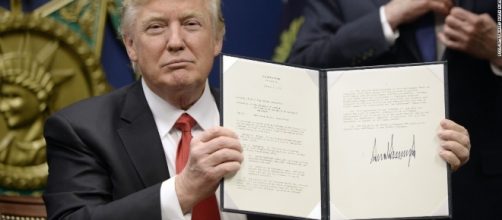President Trump and his advisors have amended the travel ban instated during January of 2017. The ban, which limited travel from several countries thought to harbor terrorists, was seen as too strict by many critics. The original ban was signed and implemented immediately. The revised executive order will go into effect on March 16, 2017. President Trump’s travel ban is seen as the fulfillment of promises made during his campaign, one of which was to secure America’s border and limit access to terrorists.
Travel ban restrictive but necessary
Travel bans from countries suspected of harboring terrorists are not new.
Unfortunately, people such as students, employees, refugees and global tourists are sometimes caught up in the midst of a travel ban. Enacted by executive order during President Trump’s first month in office, the travel ban is said to have been created intentionally to be severely restrictive in an attempt to give the new administration an opportunity to evaluate the current refugee and terrorist situation.
President Trump has stated that the travel ban enacted was done with the intention of protecting the sovereignty of the Unites States and her citizens. Travel bans have been proposed in the past to stem the spread of illness or disease. For example, travel bans on ebola-affected countries were discussed during an outbreak of the deadly disease in Western Africa.
Travel bans have also been used to keep select individuals from traveling to or from certain destinations, like in the case of Michael Savage. Michael Savage appealed several times to former secretary Hillary Clinton to intervene on his behalf to have a travel ban rescinded.
Trump’s travel ban reflects solutions
The new travel restriction goes into effect mid-March. The removal of Iraq from the list of banned countries was encouraged by President Trump’s Secretary of Defense Jim Matthis for fear of stemming progress in the elimination of terrorist organizations that country. The new exemptions; permanent residents, valid visa holders, are seen as a practical remodeling of the travel ban. The new executive order drops language offering higher status to religious minorities that many saw as anti-Muslim.
It also will allow Syrians to enter the United States after a 120 wait period and background checks instead of an indefinite termination of travel to the US.
The new language is more appealing to the masses but groups like the ACLU are still not satisfied, citing the Trump administration's supposed anti-Muslim rhetoric and preferential treatment of peoples coming from less terror and conflicted areas. The President Trump administration says that it is trying to defeat ISIS and the Muslim Brotherhood as well as secure the country and that not everybody is going to be happy with any restrictions on travel.

